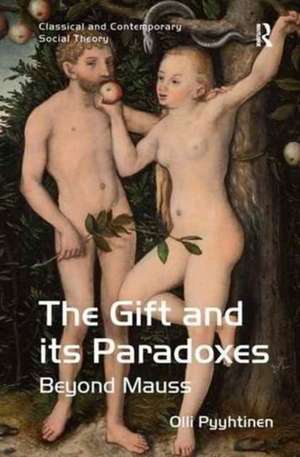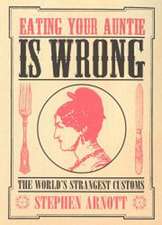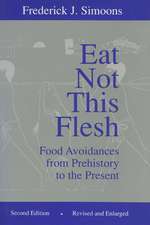The Gift and its Paradoxes: Beyond Mauss: Classical and Contemporary Social Theory
Autor Olli Pyyhtinenen Limba Engleză Paperback – 28 noi 2016
| Toate formatele și edițiile | Preț | Express |
|---|---|---|
| Paperback (1) | 481.20 lei 6-8 săpt. | |
| Taylor & Francis – 28 noi 2016 | 481.20 lei 6-8 săpt. | |
| Hardback (1) | 1053.95 lei 6-8 săpt. | |
| Taylor & Francis – 28 ian 2014 | 1053.95 lei 6-8 săpt. |
Din seria Classical and Contemporary Social Theory
-
 Preț: 309.20 lei
Preț: 309.20 lei -
 Preț: 363.67 lei
Preț: 363.67 lei -
 Preț: 281.98 lei
Preț: 281.98 lei -
 Preț: 317.81 lei
Preț: 317.81 lei -
 Preț: 155.44 lei
Preț: 155.44 lei -
 Preț: 339.95 lei
Preț: 339.95 lei -
 Preț: 326.49 lei
Preț: 326.49 lei -
 Preț: 287.83 lei
Preț: 287.83 lei -
 Preț: 325.20 lei
Preț: 325.20 lei - 26%
 Preț: 765.77 lei
Preț: 765.77 lei - 14%
 Preț: 341.58 lei
Preț: 341.58 lei - 18%
 Preț: 1002.18 lei
Preț: 1002.18 lei -
 Preț: 449.41 lei
Preț: 449.41 lei - 26%
 Preț: 763.39 lei
Preț: 763.39 lei -
 Preț: 489.26 lei
Preț: 489.26 lei -
 Preț: 489.26 lei
Preț: 489.26 lei - 9%
 Preț: 934.96 lei
Preț: 934.96 lei -
 Preț: 469.34 lei
Preț: 469.34 lei - 18%
 Preț: 1003.43 lei
Preț: 1003.43 lei -
 Preț: 382.99 lei
Preț: 382.99 lei - 18%
 Preț: 836.89 lei
Preț: 836.89 lei -
 Preț: 469.34 lei
Preț: 469.34 lei - 26%
 Preț: 763.13 lei
Preț: 763.13 lei - 14%
 Preț: 325.34 lei
Preț: 325.34 lei - 18%
 Preț: 1008.97 lei
Preț: 1008.97 lei - 18%
 Preț: 998.71 lei
Preț: 998.71 lei -
 Preț: 469.34 lei
Preț: 469.34 lei - 26%
 Preț: 816.44 lei
Preț: 816.44 lei - 26%
 Preț: 821.13 lei
Preț: 821.13 lei - 18%
 Preț: 1001.07 lei
Preț: 1001.07 lei - 18%
 Preț: 1000.45 lei
Preț: 1000.45 lei - 26%
 Preț: 818.28 lei
Preț: 818.28 lei - 18%
 Preț: 1005.31 lei
Preț: 1005.31 lei - 18%
 Preț: 1000.27 lei
Preț: 1000.27 lei -
 Preț: 381.51 lei
Preț: 381.51 lei -
 Preț: 469.34 lei
Preț: 469.34 lei - 28%
 Preț: 821.53 lei
Preț: 821.53 lei - 18%
 Preț: 1115.84 lei
Preț: 1115.84 lei -
 Preț: 389.38 lei
Preț: 389.38 lei
Preț: 481.20 lei
Nou
Puncte Express: 722
Preț estimativ în valută:
92.09€ • 95.79$ • 76.02£
92.09€ • 95.79$ • 76.02£
Carte tipărită la comandă
Livrare economică 15-29 aprilie
Preluare comenzi: 021 569.72.76
Specificații
ISBN-13: 9781138271845
ISBN-10: 1138271845
Pagini: 180
Dimensiuni: 156 x 234 x 10 mm
Greutate: 0.26 kg
Ediția:1
Editura: Taylor & Francis
Colecția Routledge
Seria Classical and Contemporary Social Theory
Locul publicării:Oxford, United Kingdom
ISBN-10: 1138271845
Pagini: 180
Dimensiuni: 156 x 234 x 10 mm
Greutate: 0.26 kg
Ediția:1
Editura: Taylor & Francis
Colecția Routledge
Seria Classical and Contemporary Social Theory
Locul publicării:Oxford, United Kingdom
Cuprins
Contents: Genesis; The (im)possible gift; The generosity of the given; Parasites’ paradise (aka like hopping on the beach); In/exclusions: the gift of blood and alms for the poor; Gendered economies of the gift; Making a gift of death; The gift is not one; Bibliography; Index.
Notă biografică
Olli Pyyhtinen is is Senior Lecturer in Sociology at the University of Turku, Finland and author of Simmel and 'the Social'.
Recenzii
’Since Mauss’s The Gift first appeared in 1924, the problematic of the gift has engaged theorists across the humanities and social sciences. Olli Pyyhtinen reviews much of this literature, while also using movies, novels, and fairy tales to offer a novel challenge to the privileging of relations of exchange and reciprocity by focusing attention back on the gift itself as a paradoxical object.’ Alan D. Schrift, Grinnell College, USA ’In this fresh take on classic theories, Olli Pyyhtinen shows not only the anthropological complexities inherent in the gift, but the necessity of engaging with it on an ontological level. By way of Derridean deconstruction, analyses of popular culture and a brilliant application of Serres's notion of the parasite, we're here presented with a most original take on an oft-misunderstood phenomenon.’ Alf Rehn, Ã…bo Akademi University, Finland
Descriere
Bringing social theory and philosophy to bear on popular movies, novels, myths, and fairy tales, The Gift and its Paradoxes explores the ambiguity of the gift: it is at once both a relation and a thing, alienable and inalienable, present and poison. Challenging the nature of giving as reciprocal, the book engages critically with the work of Mauss and develops a new theory of the gift according to which the gift cannot be reduced to a model of exchange, but must instead entail a loss or sacrifice. Ultimately, the gift is examined in the book as the impossible occurrence of gratuitous giving.











